Magic Circle Partnerships' Oxbridge and Private School Bias Exposed
A major Legal Week study has found nearly half of Magic Circle partners were educated at the elite universities, with the figure even higher at Slaughter and May.
October 29, 2019 at 06:08 AM
8 minute read
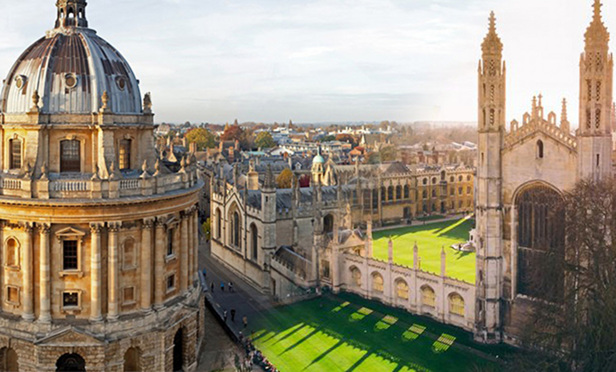 Oxbridge Universities, where nearly half of Magic Circle partners attended
Oxbridge Universities, where nearly half of Magic Circle partners attended
Two thirds of Slaughter and May's partners were educated at the Universities of Oxford or Cambridge and about half were privately educated, according to Legal Week research that lays bare the dominance of that background across the top echelons of the Magic Circle.
Across all five elite firms – Allen & Overy, Clifford Chance, Freshfields Bruckhaus Deringer, Linklaters and Slaughters – nearly 50% of the 804 London partners hailed from one of the two elite universities, based on data compiled from partners' website biographies, legal directories and LinkedIn profiles, as well as alma mater resources.
The data monitored attendance at Oxford or Cambridge, whether at undergraduate or postgraduate level.
Additionally, in every single Magic Circle firm, privately educated partners formed the largest group by educational background. In total, they accounted for more than half of the U.K.-taught total for which there is available data, according to the firms' own diversity statistics.
About 2% of the U.K.'s current university population attend Oxbridge while about 7% of the population attend private school.
The figures call into question the firms' hiring practices and have attracted criticism from campaigners such as Dr Wanda Wyporska, executive director at Equality Trust, who said "there is a huge amount of work to be done".
The Oxbridge connection
Slaughters' partnership was by far the most lopsided in terms of Oxbridge representation. Of its 92 partners, 31 went to Oxford while another 30 went to Cambridge, while just 28 went to any other university. Three partners had no available data. The firm declined to comment on the lack of diversity.
But Slaughters was far from alone. At both Freshfields and Linklaters, 48% of U.K. partners attended Oxbridge, the research found. At Clifford Chance and Allen & Overy, the figures were slightly lower, with four in 10 Clifford Chance partners attending Oxbridge, and 35% at A&O.
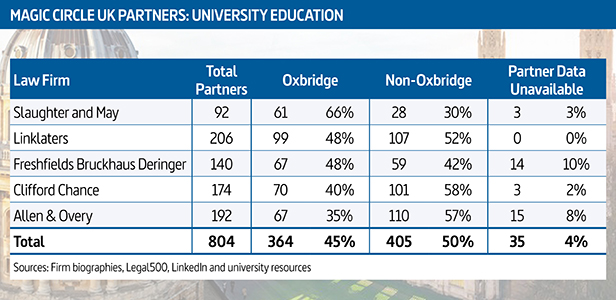 Oxbridge representation is nearly 50% overall.
Oxbridge representation is nearly 50% overall.The combined total puts Oxbridge clearly ahead of the next best-represented university, Bristol, which accounted for 39 partners (5%) across the five firms. The third and fourth best-represented universities were University College London and King's College London, with 26 (3%) and 25 (3%) respectively.
Just one university outside of England supplied more than 10 partners to the Magic Circle: Edinburgh. While fewer than five partners in total attended university in Wales or Northern Ireland.
Outside of the Russell group, representation is also extremely low. At Slaughters for example, just one partner attended a non-Russell Group U.K. University. Reading was the most-represented non-Russell Group university, amassing a total of five partners (less than 1% of the total) according to the Legal Week analysis.
Old school ties
When it comes to schooling, privately educated partners represented the largest educational group across all five firms, accounting for an average of 43% of all partners.
However, when viewed as a proportion of U.K.-educated students on which information was available, the stats were even more slanted.
Privately educated partners outnumbered state-educated partners by, on average, 10%. Allen & Overy has the most disproportionate ratio of 61:39, followed by Slaughters on 58:42.
A fifth of Linklaters partners did not declare their educational background, but its privately educated partners still outnumbered those who were state educated.
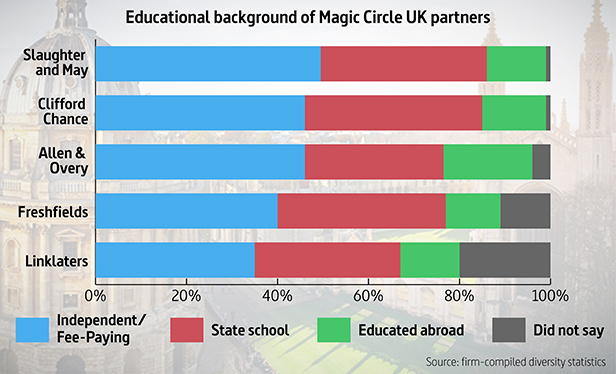 The overall educational make-up of Magic Circle firms.
The overall educational make-up of Magic Circle firms.'A complete shake-up'
Social mobility campaigners expressed frustration at the findings. "Sadly, despite decades of talk about opening up access, social mobility and widening participation, the truth holds that unless you have attended a fee-paying school, you are unlikely to reach the dizzy heights of the Magic Circle," said Equality Trust's Wyporska.
"The Oxbridge tie, who you know and your family connections still continue to pave the way to prosperity"
"There needs to be a complete shake-up in how the sector recruits and more engaging pathways into practice," continued Wyporska. "The Oxbridge tie, who you know and your family connections still continue to pave the way to prosperity.
"Conversations with the sector have reflected a willingness to engage in discussing the lack of meaningful engagement with people from a variety of socioeconomic grounds."
High representation of independent schools is not just confined to partner-level positions. Among associates, nearly half (49%) of those who were U.K. educated came from independent schools, according to the firms' own diversity data.
Nicholas Cheffings, senior counsel at Hogan Lovells and the chairman of Prime, an inter-law firm alliance aimed at encouraging social mobility in the legal industry, said law firms should harness the advantages of "contextual recruitment", where an applicant's performance is assessed within the context of their socioeconomic circumstances.
He added: "Someone who secures, say, two Bs and a C at a comprehensive school where the average is two Ds is showing the potential, the ambition and resilience that, with the right support and opportunities, can enable them to go on to become hugely successful.
"And it's limiting to assume that someone who got three A*s at a school where the average is three A*s is inevitably going to be more successful."
Steps taken so far
Despite the dominance of that particular educational background among the Magic Circle partnerships, some firms were quick to emphasise to Legal Week the measures they have put in place to improve diversity.
Gideon Moore, managing partner at Linklaters, told Legal Week: "Diversity is a central part of the firm's inclusive strategy. At Linklaters, we hire the most talented lawyers, regardless of background or university.
"We recruit from a wide range of international universities, which our partnership reflects, and in our most recent graduate intake we recruited from 38 different universities, of which 27% of trainees came from Oxbridge."
The firm has also recently introduced a digital internship aimed at students across the U.K., which allows them to do online tasks that attempt to simulate the kind of work done by international law firms.
A Clifford Chance spokesperson added: "Clifford Chance is committed to establishing an inclusive culture where people from diverse backgrounds work effectively together, and where they feel comfortable and confident to reach their potential."
The firm has taken on a number of student-related initiatives including Spark, a five-day scheme that provides first-year students with an inside view of the firm, and which this year opened its doors to students from 21 universities; and Target Oxbridge, which aims to promote and support diversity of intakes into the two universities.
The moves echo efforts across the industry, where social mobility and diversity have risen up firms' agendas.
Slaughter and May runs an 'accelerators' programme for Year 12 students from Islington schools, providing them with week-long placements across legal and business services teams.
Allen & Overy has celebrated the 10th anniversary of its work experience programme, Smart Start, which has since launched in Hong Kong, South Africa and India. Freshfields meanwhile runs the Freshfields Stephen Lawrence Scholarship Scheme to fund those from disadvantaged backgrounds to attend university.
This year, law firms made up nearly a third of the Social Mobility Employer Index, run each year by the Social Mobility Foundation. All five of the Magic Circle appeared on the list, stretching from Linklaters in ninth to Freshfields in 64th.
"There is definitely more work to be done in terms of retention – and part of that is around culture"
But while a lot of work is being put into promoting diversity in the workplace, there are still question marks over whether this is permeating through the ranks of Magic Circle firms themselves.
Cheffings of Prime added that law firms need to focus on creating an inclusive culture. "I think firms are doing much, much better now at attracting people from a wider background, but there is definitely more work to be done in terms of retention – and part of that is around culture and it's about creating a sense of belonging and not exclusion," he said.
"The expression that is often used here is eliminating micro-aggressions, which are nearly always unconscious. It's about being aware of different people's background and how things will land differently with them, and empowering people to call out inappropriate behaviour."
This content has been archived. It is available through our partners, LexisNexis® and Bloomberg Law.
To view this content, please continue to their sites.
Not a Lexis Subscriber?
Subscribe Now
Not a Bloomberg Law Subscriber?
Subscribe Now
NOT FOR REPRINT
© 2025 ALM Global, LLC, All Rights Reserved. Request academic re-use from www.copyright.com. All other uses, submit a request to [email protected]. For more information visit Asset & Logo Licensing.
You Might Like
View All
Singapore Litigators Shift Competitive Landscape as Another Senior Duo Sets Up Own Shop
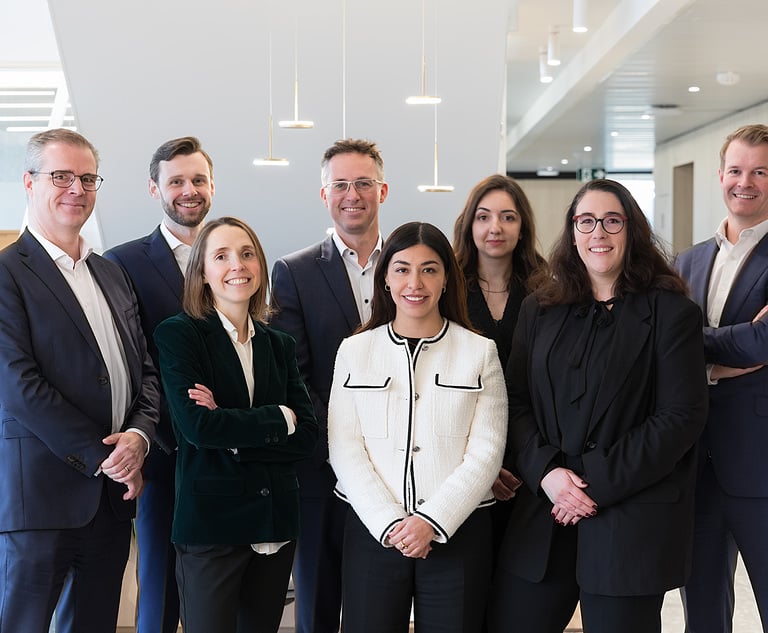
Squire Patton Boggs Hires 7-Lawyer Team to Beef Up ESG Practice in Brussels
2 minute read
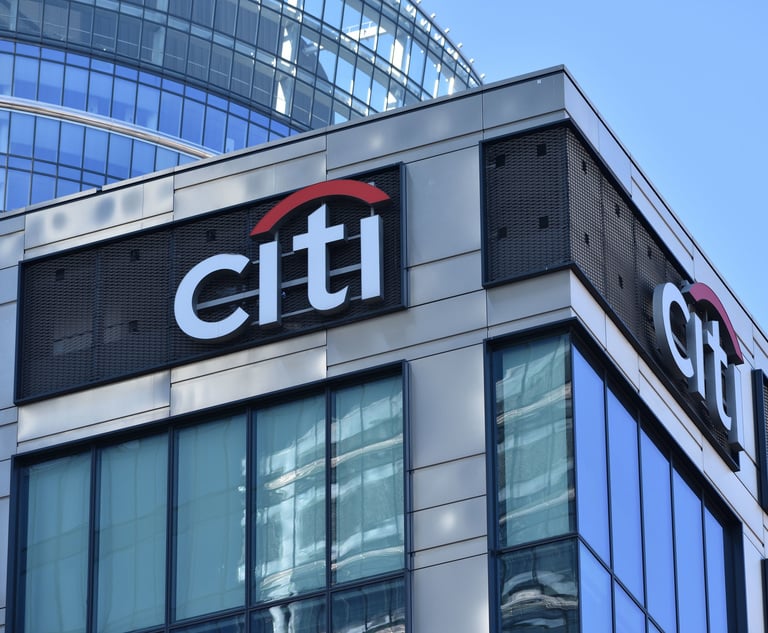
Skadden, White & Case Guide Citigroup Demerger in Mexico
Trending Stories
- 1No Two Wildfires Alike: Lawyers Take Different Legal Strategies in California
- 2Poop-Themed Dog Toy OK as Parody, but Still Tarnished Jack Daniel’s Brand, Court Says
- 3Meet the New President of NY's Association of Trial Court Jurists
- 4Lawyers' Phones Are Ringing: What Should Employers Do If ICE Raids Their Business?
- 5Freshfields Hires Ex-SEC Corporate Finance Director in Silicon Valley
Who Got The Work
J. Brugh Lower of Gibbons has entered an appearance for industrial equipment supplier Devco Corporation in a pending trademark infringement lawsuit. The suit, accusing the defendant of selling knock-off Graco products, was filed Dec. 18 in New Jersey District Court by Rivkin Radler on behalf of Graco Inc. and Graco Minnesota. The case, assigned to U.S. District Judge Zahid N. Quraishi, is 3:24-cv-11294, Graco Inc. et al v. Devco Corporation.
Who Got The Work
Rebecca Maller-Stein and Kent A. Yalowitz of Arnold & Porter Kaye Scholer have entered their appearances for Hanaco Venture Capital and its executives, Lior Prosor and David Frankel, in a pending securities lawsuit. The action, filed on Dec. 24 in New York Southern District Court by Zell, Aron & Co. on behalf of Goldeneye Advisors, accuses the defendants of negligently and fraudulently managing the plaintiff's $1 million investment. The case, assigned to U.S. District Judge Vernon S. Broderick, is 1:24-cv-09918, Goldeneye Advisors, LLC v. Hanaco Venture Capital, Ltd. et al.
Who Got The Work
Attorneys from A&O Shearman has stepped in as defense counsel for Toronto-Dominion Bank and other defendants in a pending securities class action. The suit, filed Dec. 11 in New York Southern District Court by Bleichmar Fonti & Auld, accuses the defendants of concealing the bank's 'pervasive' deficiencies in regards to its compliance with the Bank Secrecy Act and the quality of its anti-money laundering controls. The case, assigned to U.S. District Judge Arun Subramanian, is 1:24-cv-09445, Gonzalez v. The Toronto-Dominion Bank et al.
Who Got The Work
Crown Castle International, a Pennsylvania company providing shared communications infrastructure, has turned to Luke D. Wolf of Gordon Rees Scully Mansukhani to fend off a pending breach-of-contract lawsuit. The court action, filed Nov. 25 in Michigan Eastern District Court by Hooper Hathaway PC on behalf of The Town Residences LLC, accuses Crown Castle of failing to transfer approximately $30,000 in utility payments from T-Mobile in breach of a roof-top lease and assignment agreement. The case, assigned to U.S. District Judge Susan K. Declercq, is 2:24-cv-13131, The Town Residences LLC v. T-Mobile US, Inc. et al.
Who Got The Work
Wilfred P. Coronato and Daniel M. Schwartz of McCarter & English have stepped in as defense counsel to Electrolux Home Products Inc. in a pending product liability lawsuit. The court action, filed Nov. 26 in New York Eastern District Court by Poulos Lopiccolo PC and Nagel Rice LLP on behalf of David Stern, alleges that the defendant's refrigerators’ drawers and shelving repeatedly break and fall apart within months after purchase. The case, assigned to U.S. District Judge Joan M. Azrack, is 2:24-cv-08204, Stern v. Electrolux Home Products, Inc.
Featured Firms
Law Offices of Gary Martin Hays & Associates, P.C.
(470) 294-1674
Law Offices of Mark E. Salomone
(857) 444-6468
Smith & Hassler
(713) 739-1250








